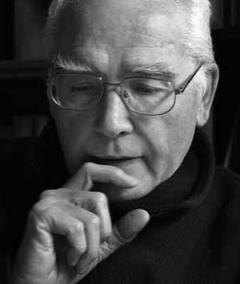Manzoni, Giacomo
Biography
Born: 26 September 1932, Milan, Italy
Country: Italy
Studies: Messina Liceo Musicale (1948-50), Milan Cons. (1956)
Teachers: G. Contilli
Website:
Giacomo Manzoni (born Milan 26 September 1932) is an Italian composer. He studied composition from 1948 in Messina with Gino Contilli, and continued his studies from 1950 to 1956 at the Conservatoire of Milan. In 1955 he obtained a doctorate in foreign languages from the Bocconi University in Milan. He taught on the faculty of the Conservatorio Giovanni Battista Martini in Bologna.
He wrote the music for the film Malina (1991).[1]
Giacomo Manzoni started to study composition in Messina in 1948 under the guidance of Gino Contilli, and continued from 1950 to 1956 at Milan Conservatory; in 1955 he obtained a degree in Foreign Languages and Literature from the Bocconi University in Milan. He began his career as an orchestral player and choral director, and in 1956 was the editor of the journal of contemporary music «Il Diapason»; from 1958 to 1966 he worked as the music critic of the newspaper «L’Unità», and from 1962 he taught harmony and counterpoint at Milan Conservatory. From 1969 to 1974 he taught composition at the G.B. Martini Conservatory in Bologna, moving afterwards to the Giuseppe Verdi Conservatory in Milan until 1991. Manzoni was in residence in Berlin in 1982 as a guest of the German Academic Exchange Service. Since 1988 he has held a special course in composition at the Fiesole School of Music. He has also given seminars and courses in Pescara, San Marino, at the University of Parma, in Granada, Buenos Aires, Berlin, Vancouver, Córdoba, Santiago, Osaka, etc.
Among his principal compositions are the theatrical works La sentenza (Bergamo, 1960, Teatro delle Novità), Atomtod (Milan, 1965, Piccola Scala); the musical scenes Per Massimiliano Robespierre (Bologna, 1975, Teatro Comunale), from which the Suite Robespierre was derived; vocal compositions with orchestra, including Ombre (alla memoria di Che Guevara) (1968), Parole da Beckett, (1971) for two choruses, three instrumental groups and magnetic tape, and Hölderlin (frammento) for chorus and orchestra (1972); other orchestral pieces include Insiemi (1967) for orchestra, Modulor for four orchestras (premièred at the Venice Biennale in 1979) and Masse: omaggio a Edgard Varèse (1977) for piano and orchestra, Scene sinfoniche per il Doktor Faustus (1984), Doktor Faustus - Scene dal romanzo di Thomas Mann (Milan, 1989, La Scala), Il deserto cresce. Tre metafore da Friedrich Nietzschefor chorus and orchestra (1993) and, among his more recent works, Allen for reader and chamber orchestra (1996) and Moi, Antonin A. to texts by A. Artaud for light soprano, reader and orchestra (Florence, 1997). Manzoni has also composed chamber works, including: Piccola suite (1952-55) for violin and piano, Musica notturna (1966), Quadruplum (1968) for two trumpets and two trombones, a String Quartet (1971), and Hölderlin: Epilogo (1980) for ten instruments and Opus 50 (Daunium) for ten instruments and percussion (1984), and a second string quartet entitled Musica per Pontormo (1995).He was a member of the editorial board of the Dizionario, and later of the Enciclopedia della musica published by Ricordi (1964). In the same period he translated into Italian Philosophie der neuen Musik (Turin, 1959, Einaudi) and Dissonanzen by Adorno (Milan, 1959, Feltrinelli), and Harmonielehre by Schönberg (Milan, 1963, Il Saggiatore). He has also translated other didactic works by Schönberg as well as a collection of unpublished essays under the title Analisi e pratica musicale (Turin, 1974, Einaudi). In 1975, in collaboration with L. Pestalozza and V. Puecher, he published Per M. Robespierre - Testo e materiali per le scene musicali (De Donato, Bari) to coincide with that work’s first performance. Manzoni has contributed essays on early and modern composers (Monteverdi, Brahms, Dallapiccola, etc.) and on various musical topics to many Italian and foreign publications. In 1968 he was music editor of the journal «Prisma» and is currently a member of the editorial staff of the journal «Musica/Realtà». The recording of Masse: omaggio a Edgard Varèse has won several international prizes, and the composition Dedica received the Abbiati Critics’ Prize for the best new Italian work of 1986.
In 1991 Manzoni was awarded the ‘Omaggio a M. Mila’ prize for his teaching activity.[2]
Works for Percussion
D'Improvviso – Percussion Sextet
References
